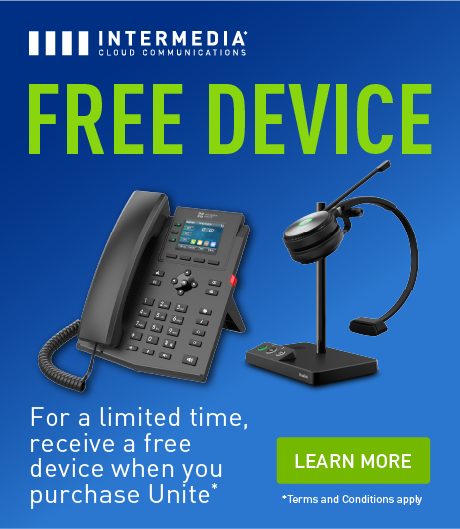Do you want your business to thrive and keep thriving? Then you’ll need the right technologies to make your communications seamless for your team and clients.
For example, traditional phone systems with analog private branch exchanges have restrictive limitations that slow down closing deals and delivering services. By comparison, moving your PBX to the cloud enables superior mobility and flexibility for greater profitability.
In fact, the many advantages of cloud-based systems are why unified communications are now the dominant business phone service. Recent reports put the adoption of UC among companies at 47.3%, a figure that is rapidly growing.
If you’re considering upgrading your phone service, you’ll want to know about PBX cloud phone systems. Discover what cloud PBX is, how it works, and the benefits of this solution.

Key Takeaways:
- A PBX is your company’s private, internal communications service.
- Modern PBX systems run entirely in the cloud, but you can also connect a legacy on-premise arrangement to the cloud for a hybrid setup with all the benefits.
- Cloud PBX services offer greater cost savings and advanced productivity features for your company.
- Cloud PBX phone systems are more reliable than traditional systems.
- Your PBX provider needs to have excellent customer support and data security.
What Is a PBX Cloud Phone System?
PBX stands for Private Branch Exchange. PBX phone systems have been around since the 1960s, and create a secure internal telephone network within a single organization.
In the past, PBX systems were completely analog and only worked on the physical premises of the user’s location. In contrast, modern PBX cloud phones transfer all communications over the internet and don’t require traditional phone lines.
As a result, you still have all the same features for call routing and management, but without the extra costs. If that sounds like a system you’re ready to invest in, talk to a local representative from Intermedia to discover how you can get started as soon as possible.
Video Embed: Intermedia Cloud Communications – Work Better. From Wherever.
How Do PBX Phone Systems Work, and How Do They Differ From Public Phone Networks?
PBX phone systems operate on many of the same principles as public landlines, but have critical differences that make getting a PBX a smart move for a business.
The Capabilities of Traditional Landlines
Traditional landline phones first operated over the Public Switched Telephone Network. The PSTN used copper wiring and fiber optic cables to connect exchanges around the world at a low cost. However, the signal quality and data transfer rates are low, maxing out at about 24 kbps.
Because of its rudimentary capabilities and long-term use, many communications professionals refer to the PSTN as the Plain Old Telephone Service (or POTS). Still, this universal system allows people to connect with voice calls, no matter their service provider.
In time, more sophisticated data transfer across phone lines became necessary, especially with the arrival of the internet. The Integrated Services Digital Network appeared and briefly provided a workable solution, with higher-speed connections up to 192 kbps.
However, what if you run a company with many offices and want to connect your team internally and inexpensively? What is PBX able to do to improve your communications?
How a PBX Enhances Business Connectivity
It would become very costly for you to give each member of your organization a separate business phone line. However, PBX allows everyone to have internal phone connections that share an external line.
The arrangement is similar to a company’s mailroom. Workers can easily send messages to each other through the internal mail system without worrying about going through the post office.
The team shares the same physical mailing address, and the mailroom receives and distributes incoming outside correspondence to employees. Workers can also give the mailroom letters to send to external parties that come from that single commercial address.
Likewise, a PBX provides secure internal telephony. Team members can reach each other internally by dialing extensions, keeping conversations off of the less-secure public network.
Still, employees are on a single public phone line when they wish to communicate with external parties. The system receives and directs calls to the appropriate individual through an extension that the caller or operator inputs. When workers want to dial out, the connection originates from the one company phone line.

Your PBX can connect to the outside world via analog or digital phone lines, but modern systems do not have to rely on POTS. Voice over Internet Protocol is now the preferred method for voice calls.
VoIP transfers conversations using your high-speed internet connection. As a result, your PBX has high-definition voice calls and a full range of other communications channels, including video, SMS, and social media. You also gain a host of other benefits.
What Are the Benefits of PBX Systems for Businesses?
Cloud functionality has taken PBX capabilities to another level. Consider the many reasons your business can benefit from a cloud-based PBX phone system.
Cost Savings
As we mentioned previously, a PBX system is much more cost-effective than trying to give every employee a separate traditional landline. Plus, with a cloud-based PBX, you can save even more money than with a legacy phone system.
Cloud PBX services don’t require physical equipment. No on-site servers means no server updates or maintenance. Furthermore, you won’t incur more costs every time you need to add a user, which often requires paying an on-site technician.
Additionally, you’ll save on the service itself when you get your PBX through a unified communications as a service subscription. You only receive one bill from one provider that doesn’t fluctuate or inflate depending on usage. All the maintenance and updates to the software are included in that monthly cost as well.
Simple Installation
With a cloud PBX system, everything is plug-and-play. If you need to add or remove a feature, you can do it in minutes from an administrative interface.

Advanced Productivity Features
The cloud also lets you enjoy features not readily available on a standard PBX, meaning you can keep up with and outpace your competition. With the following UCaaS features, your team can operate more efficiently.
Virtual Voicemail
Your team can access voicemails in multiple ways, even without calling into a system and using a PIN. Voicemail transcripts are retrievable via email or your communications mobile app. You can also easily forward a voicemail if another party needs to respond.
Call Analytics
You’ll no longer struggle to understand the performance of customer-facing team members in sales and support departments. Data from call analytics deliver insights that you can use to optimize efficiencies and improve customer engagement.
Spam Caller Protection
Cloud phone systems can identify telemarketing calls and suspected scammers. You can then decide to route these connections directly to voicemail or block them altogether.
Business Software Integrations
A cloud-based PBX phone platform can also integrate with other software, including applications like Microsoft Office 365 and customer relationship management solutions. Allowing your programs to work together this way boosts efficiency and reduces data entry errors.
Advanced Call Schedules
Create a PBX network tree to establish rules for how the system routes incoming calls. For example, you can limit international dialing to control expenses and ensure VIP clients receive prompt attention.
Call Transfers
Outdated PBX services made transferring calls difficult with a complex set of keypad entries. You might accidentally lose a connection (and a customer as a result). Modern cloud PBX services make call transfers between departments a breeze.
Custom Greetings and Music
You don’t need a separate service to choose your preferred hold music and customized greetings. Your administrative portal also makes these easy to adjust, allowing you to change greetings according to the season or special promotions.
Connections to Multiple Locations
Analog PBX systems demanded a separate setup for each office and the use of POTS to bring them together. Hosted PBX allows a secure internal connection to all locations, including for remote workers.
Contact Center Capabilities
You don’t need a separate contact center solution or software to work with your UC. Your internal and external calling coordinates effortlessly, and you can handle a seemingly limitless number of callers with the cloud-based PBX.
Reliability and Business Continuity
Your phone system is your business’s lifeline. Without it, you won’t be able to create and close deals or support your clients. Therefore, a reliable phone system that ensures business continuity is a must.
PBX cloud systems from Intermedia offer outstanding reliability with near-perfect uptime. When sourcing any cloud solution, ask about the uptime percentage and how your provider monitors its network.
Also, if an incident occurs that causes a downtime situation, you can still forward calls to mobile devices. These capabilities keep you connected to colleagues and customers.
https://www.youtube.com/watch?v=3X6B3tJVmHg
What Are the 3 Different Types of PBX Phone Systems?
When it comes to PBX systems, you have three different choices: hosted, on-premise, and hybrid. Find out which is best for you.
1. Hosted PBX
A hosted PBX system is the cloud-based internal phone line we’ve been touting so highly. Why do communications professionals call it a hosted system? The reason is that your provider hosts the hardware that runs your service. You will also hear people refer to hosted PBX as cloud PBX, virtual PBX, or IP PBX.
The advantage is that you eliminate the cost of installing, securing, maintaining, and upgrading such a system. With a low-cost monthly subscription, your small or mid-sized business can access the same features as your larger competitors.
Instead of using traditional phone lines, your PBX system connects internally and externally with VoIP. These online connections open up many ways for users to make and receive calls.
For example, you can use a desk phone that plugs into a router, similar to conventional PBX phones. Additionally, you can use an application on your desktop or mobile phone for softphone capabilities. Cloud-based phones offer true versatility for taking and placing calls from anywhere, making them ideal for remote and hybrid work.
Furthermore, the data you acquire from cloud PBX usage, such as data from voicemails, emails, and text messages, reside in the cloud. This feature makes archiving and retrieving conversations straightforward for training or legal purposes.
2. On-Site PBX
On-premise PBX lines are the traditional alternative. These connections tie your team to a single location, limiting your talent pool and mobility. Another downside is the weeks or months it takes to install an on-premise system.
The primary advantage of this system is the level of control and security you can maintain. Everything is in-house, and your internal switchboard processes it all. However, this control comes at a cost that is prohibitive for SMBs.
On-site systems usually require you to contract with other companies for advanced data features. You need sophisticated and expensive technology to achieve the kind of automation that comes standard with a hosted system. Plus, working with multiple vendors becomes costly and complicates things for accounts payable.
3. Hybrid PBX
What if you already have a legacy system and you want to get your money’s worth out of it? Do you have to forego the benefits of a hosted PBX? Not at all!
You can access VoIP telephony on your on-site PBX through Session Initiation Protocol technology. With SIP trunking, you can now access the benefits of the cloud if it’s impractical at this point to ditch your legacy system.
Of course, you will still have the costs that come with maintaining and securing the physical features of your PBX. However, you can put yourself in a prime position to seamlessly switch to a fully cloud-based solution one day.
How Do You Choose the Right PBX Phone Type For Your Business?
Consider your current PBX setup. If you’re starting from scratch, setting up on the cloud will be the best way to go. As we’ve mentioned, cloud phones are:
- Less expensive
- More secure
- More reliable
- More flexible
- Equipped with more productivity features
SMBs really have no better solution than cloud-based PBX services.
Sizable companies that already have an on-premise system can benefit from SIP trunking. You can still get life out of your legacy system, but start to benefit from remote work capabilities and the productivity features of hosted PBX.
Why Move Your Traditional PBX to the Cloud?
Remote and hybrid work have become the norm. This shift has caused many companies to rethink their internal and external communications and migrate everything to the cloud.
Converting to the cloud for applications across your enterprise offers freedom from a centralized work location. Forward-thinking companies recognize the need to provide flexibility to their teams regarding communications.
In fact, this flexibility is critical for attracting top talent to whom you should entrust sufficient mobility and leeway. When you move to the cloud, you can have confidence that your PBX is secure, agile, cost-effective, and scalable.

Harness the Future of PBX Communications With the Cloud
The telephone has been a staple for over 100 years, but that doesn’t mean you have to remain stuck to old technology. Moving to the cloud simplifies your infrastructure, saves money, delivers more features, and provides greater reliability.
Ready to upgrade your PBX phone system? Contact us today to discuss how the cloud can support your growing business by keeping you connected better than ever.
October 9, 2023
Explore other posts on these topics: Unified Communications





